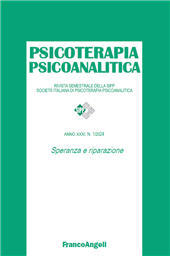La speranza come atteggiamento sentimentale e come forza che opera nella realtà
P. 17-24
L'Autore prende avvio da un'intuizione di W.R. Bion inerente il rapporto tra speranza e paura. Il suo discorso si snoda poi seguendo la traccia di interrogativi che emergono dalla disamina del concetto di speranza: esistono differenti forme di speranza? Tra queste ve ne è una che è maggiormente in grado di ‘resistere' alla paura? Se E. Bloch pone Il principio di speranza al centro della coscienza anticipante dell'uomo, anche la paura può occupare un posto centrale in essa lavorando, però, in direzione opposta alla speranza e bloccando l'iniziativa dell'uomo? L'autore sostiene che la speranza e l'iniziativa dell'uomo possono essere bloccate dalla paura generata da un Super-Io crudele e persecutorio che punisce severamente ogni più piccolo errore. Il terrore per la punizione del SuperIo inibisce il sentimento creativo della speranza perché per poter essere creativi ed usare la forza della speranza bisogna poter sbagliare senza conseguenze.
La fede dell'analista in se stesso, nella psicoanalisi, nel paziente è essenziale per il radicamento di un atteggiamento del paziente orientato verso la speranza. [Testo dell'editore]
The author starts from an insight by W.R. Bion concerning the rela-tionship between hope and fear. His discourse then follows the track marked by questions that emerge from the examination of the concept of hope: are there different forms of hope? Among these, is there one that is most able to ‘resist' fear? If E. Bloch places The principle of hope at the centre of man's anticipatory consciousness, can fear also occupy a central place in it, working, however, in the opposite direction to hope and blocking man's initiative? The author argues that human hope and initiative can be blocked by fear generated by a cruel and persecutory Super-Ego that severely pun-ishes every smallest mistake. Fear of punishment from the Super-Ego inhibits the creative feeling of hope because in order to be creative and use the power of hope, one must be able to make mistakes without consequences.
The analyst's faith in himself, in psychoanalysis and in the patient is essential for the rooting of a hope-oriented attitude of the patient. [Publisher's text]
Is part of
Psicoterapia psicoanalitica : 1, 2024-
Articles from the same issue (available individually)
-
Information
ISSN: 2531-6753
KEYWORDS
- speranza, paura, Super-Io, fede, suicidio
- hope, fear, Super-Ego, faith, suicide


